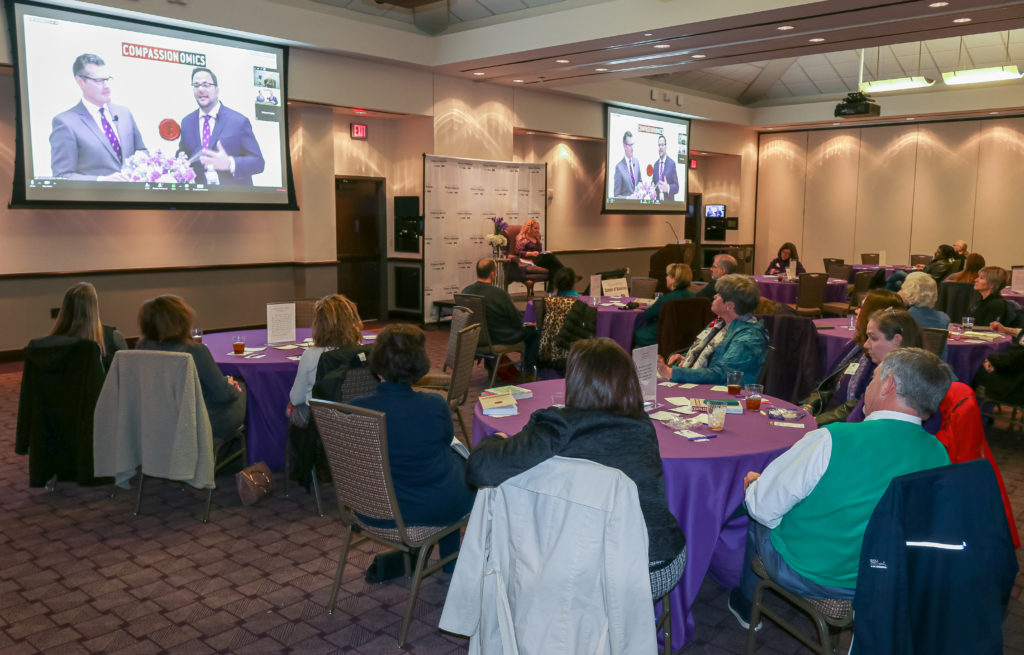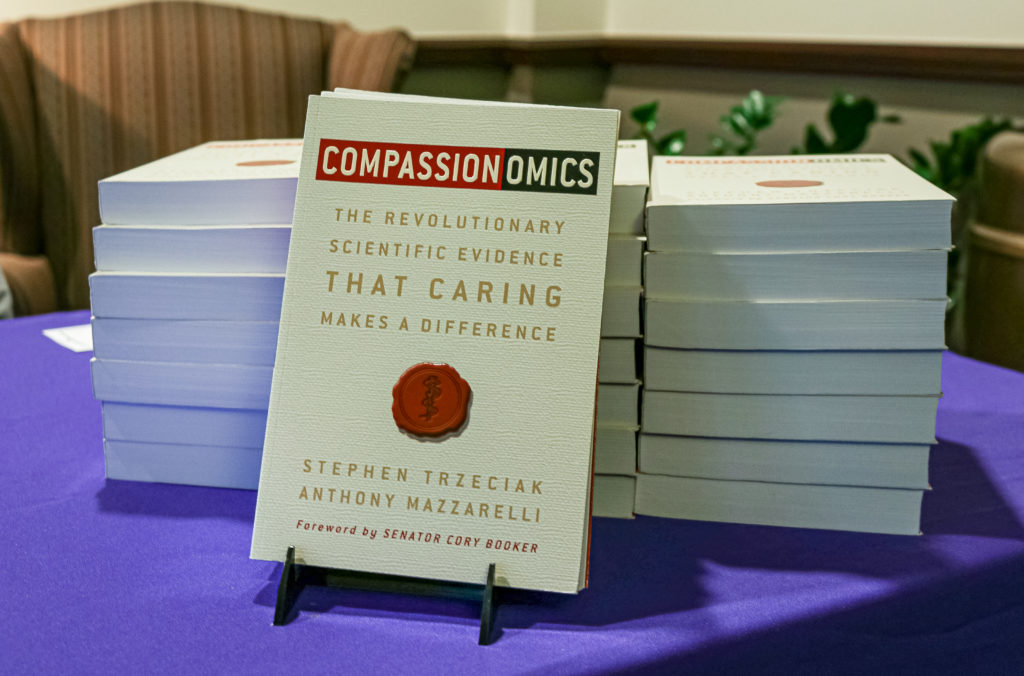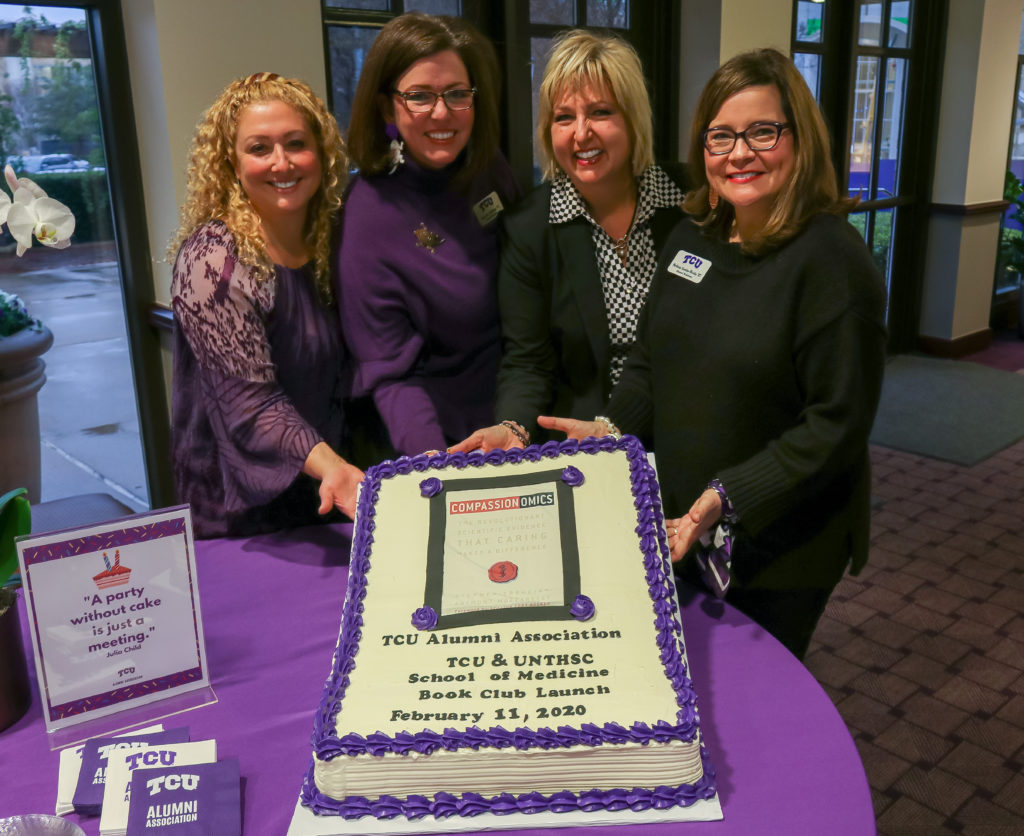Can compassion make a difference in health care? These doctors have the science to prove it.
TCU Alumni Association partners with the TCU and UNTHSC School of Medicine to launch Alumni Book Club discussions.
FORT WORTH – The delivery of health care in a compassionate manner is more effective than health care provided without compassion, according to the book Compassionomics: The Revolutionary Scientific Evidence that Caring Makes a Difference.
About 50 community members attended the launch of the TCU Alumni Association‘s Book Club on February 11 at Texas Christian University to hear from the book’s authors, Stephen Trzeciak, M.D., M.P.H., and Anthony Mazzarelli, M.D., J.D., M.B.E.
The discussion was moderated by Evonne Kaplan-Liss, M.D., M.P.H, the assistant dean of narrative reflection and patient communication at the TCU and UNTHSC School of Medicine, on a topic she is well-versed in as a physician and educator, compassion and communication.
“If you ask most patients, they think doctors are trained in communication and compassion,” Dr. Kaplan-Liss said. “They are in different ways in different medical schools but there still is an issue with the lack of compassion in medicine. We spent half a decade trying to convince thousands of STEM scientists and health care professionals why it matters. We needed to validate what we were doing and when this book came out, we were able to check that box off.”

For an hour and a half, the authors answered questions about their compelling research that health care is currently in the midst of a compassion crisis. They argue that human connection can provide distinct and measurable benefits.
“The good news is that science shows that we actually can get better and that’s a big emphasis in the book,” Dr. Trzeciak said. “The overwhelming evidence is that if one believes they can get better they will.”
To provide context to this point the authors explore four of the driving factors behind the power of including compassion in practicing medicine: It benefits patients and improves clinical outcomes; it reduces costs for health care systems and patients; health care providers who practice compassion are at a lower risk of experiencing burnout; and that compassionate behaviors are contagious in the social networks of health care providers and that can amplify the beneficial effects of compassionate health care.
But, as they have traveled the country giving talks about their findings, many health care providers raise concerns about the cost and time associated with practicing medicine with more compassion, according to Dr. Mazzarelli.
“When providers have a patient-centered practice the data shows they order less tests, they refer to specialists less, patients end up in the hospital less and the total charges at the end of the year are less,” Dr. Mazzarelli said. “You actually end up with less costs for those patients.”

Finding more practical and cost-effective ways to reducing health care costs is important to the bottom line of many health care systems. The American health care system is estimated to spend between $100 billion and $289 billion a year on non-adherence by patients, according to a 2017 New York Times article.
“Some of the most numerous studies on compassion show that when you have a care giver who is more compassionate people are more likely to adhere to their medications,” Dr. Mazzarelli said. “In almost every area when they looked at compassion it could lower cost.”
The authors’ message mirrors the Fort Worth medical school’s mission, which is to transform health care by inspiring Empathetic Scholars™.
Dr. Kaplan-Liss is currently the nation’s first dean whose sole focus is patient communication curriculum. Before joining the medical school, she helped pioneer a new approach to medical education as founding medical director of the Alan Alda Center for Communicating Science in New York state that included communications training.
At the Fort Worth medical school, communication training is embedded in all four years of the curriculum through The Compassionate Practice™.
“It’s important to support programs to be able to develop and train health care providers to communicate with compassion because it’s needed,” Dr. Kaplan-Liss said.
 Can doctors be taught how to be compassionate?
Can doctors be taught how to be compassionate?
“When we started this journey, I personally did not believe compassion was something that you could learn,” Dr. Trzeciak said. “When you look at the biomedical literature and the scientific literature at large even in psychology studies the evidence shows quite clearly that empathy and compassion can be learned.”
The thing about learning how to be more compassionate is that you need the right type of training, especially for health care providers. The right kind of compassion training program can enhance altruistic behavior to cultivate feelings of compassion for other people, according to a 2018 study published by Nature.
“What we’re talking about are behaviors and not what someone believes in their mind,” Dr. Trzeciak said. “But how you behave towards another person which is ultimately what they’re going to be experiencing.”
An audience member brought up the challenge of maintaining compassion while encountering stress as a caregiver. There’s a current gap in the knowledge about the effects of compassion training and how often an individual might need to brush up on their skills, according to Dr. Trzeciak. “Is it something where every couple of months you need a refresher,” Dr. Trzeciak said.
Practicing medicine with compassion is not a quick fix for health care providers, the authors said. It is also a part of the art of practicing medicine and something to have in your toolbox as a health care provider, according to Dr. Mazzarelli.
“We make no claims that we’re more compassionate than any other doctor. We’re both works in progress,” Dr. Mazzarelli said. “After this two-year journey, I am a little more compassionate but I’m still working on it every shift and every day that I see patients.”
Prescotte Stokes III is the Integrated Content and Marketing Manager. You can reach him at p.stokes@tcu.edu